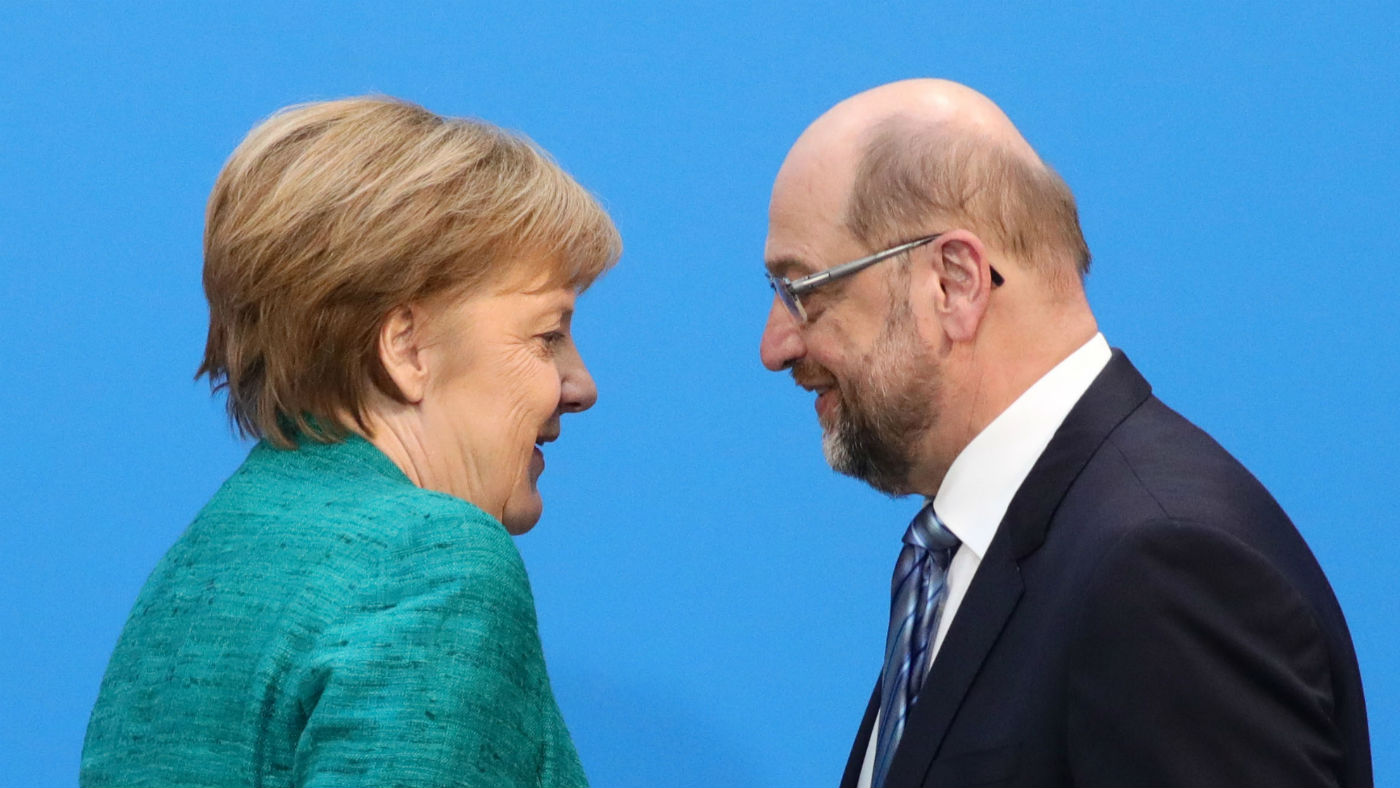Angela Merkel finally agrees ‘grand coalition’ deal
What does German political settlement mean for the rest of Europe?

A free daily email with the biggest news stories of the day – and the best features from TheWeek.com
You are now subscribed
Your newsletter sign-up was successful
After months of political deadlock, German Chancellor Angela Merkel has finally agreed a coalition deal with the centre-left Social Democrats (SPD), an agreement which would see the rightwing populist Alternative fur Deutschland become the main opposition party.
The breakthrough promises to end a prolonged period of uncertainty in Germany, paving the way for a renewed “grand coalition” between the SPD and conservative CDU/CSU alliance, which would enable Merkel to stay on as leader for a fourth term.
The SPD has managed to secure the finance, foreign and labour ministries as part of the deal, “a significant feat for the leader, Martin Schulz”, who is set to land the job of foreign minister, says The Guardian.
The Week
Escape your echo chamber. Get the facts behind the news, plus analysis from multiple perspectives.

Sign up for The Week's Free Newsletters
From our morning news briefing to a weekly Good News Newsletter, get the best of The Week delivered directly to your inbox.
From our morning news briefing to a weekly Good News Newsletter, get the best of The Week delivered directly to your inbox.
The deal follows a month of frantic, and at times acrimonious, negotiations between the SPD and Merkel’s centre-right Christian Democratic Union (CDU). Among the most contentious issues were workers’ rights, healthcare, the future of Europe, the Eurozone and, most divisively, immigration.
CNN says the agreement “represents a U-turn by the SPD, which had originally said it would rather rebuild itself in opposition than prop up another Merkel administration, after suffering its worst election result since World War II”.
“Handing Germany’s centre-left control of finance, foreign and labour policy would have a big impact on the rest of the world, particularly Europe” and make Germany “more likely to go along with French President Macron’s ambitious plans for EU reform, by allowing more German support for struggling eurozone economies,” says the BBC’s Damien McGuinness.
The deal still has to be ratified by the SPD’s sceptical 460,000-strong membership and The New York Times says the vote is “too close to call”. But “an agreement which looks like a win for the SPD will increase the likelihood that they will vote yes”, says McGuiness.
A free daily email with the biggest news stories of the day – and the best features from TheWeek.com
In a sign of how the deal is seen in Germany, Reuters quotes Julian Reichelt, editor of the country’s biggest selling paper, Bild. He suggested the SPD had got the better end of the deal, tweeting: “This is the first SPD government led by a CDU chancellor.”
More of a problem for both coalition partners is the widespread opposition to the deal from German voters at large. A recent poll from public broadcaster ARD showed that 52% of respondents did not think another grand coalition was a good idea.
It could still be that SPD members reject the proposals, leading the way for fresh elections. If Merkel does hang on for another term, there could be dire long-term consequences for both her party and the Social Democrats - and her last term might usher in a more extreme alternative.
-
 ‘Restaurateurs have become millionaires’
‘Restaurateurs have become millionaires’Instant Opinion Opinion, comment and editorials of the day
-
 Earth is rapidly approaching a ‘hothouse’ trajectory of warming
Earth is rapidly approaching a ‘hothouse’ trajectory of warmingThe explainer It may become impossible to fix
-
 Health insurance: Premiums soar as ACA subsidies end
Health insurance: Premiums soar as ACA subsidies endFeature 1.4 million people have dropped coverage
-
 Epstein files topple law CEO, roil UK government
Epstein files topple law CEO, roil UK governmentSpeed Read Peter Mandelson, Britain’s former ambassador to the US, is caught up in the scandal
-
 Iran and US prepare to meet after skirmishes
Iran and US prepare to meet after skirmishesSpeed Read The incident comes amid heightened tensions in the Middle East
-
 Israel retrieves final hostage’s body from Gaza
Israel retrieves final hostage’s body from GazaSpeed Read The 24-year-old police officer was killed during the initial Hamas attack
-
 China’s Xi targets top general in growing purge
China’s Xi targets top general in growing purgeSpeed Read Zhang Youxia is being investigated over ‘grave violations’ of the law
-
 Panama and Canada are negotiating over a crucial copper mine
Panama and Canada are negotiating over a crucial copper mineIn the Spotlight Panama is set to make a final decision on the mine this summer
-
 Why Greenland’s natural resources are nearly impossible to mine
Why Greenland’s natural resources are nearly impossible to mineThe Explainer The country’s natural landscape makes the task extremely difficult
-
 Iran cuts internet as protests escalate
Iran cuts internet as protests escalateSpeed Reada Government buildings across the country have been set on fire
-
 US nabs ‘shadow’ tanker claimed by Russia
US nabs ‘shadow’ tanker claimed by RussiaSpeed Read The ship was one of two vessels seized by the US military